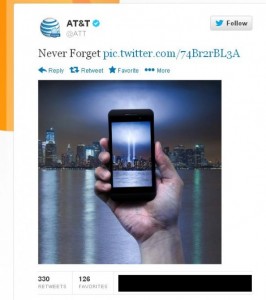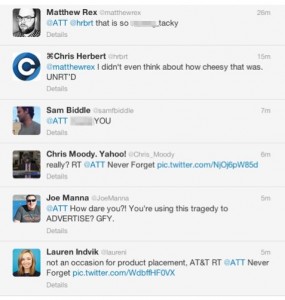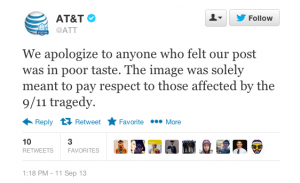In light of the tragic event of 9/11, society mourns the heartbreaking losses that thousands of people experienced after the terrorist attack on the Twin Towers in New York City. While some took time out of their day to visit memorials dedicated to their departed loved ones, others paid their respects by taking a moment of silence to remember those precious lives lost. Still others, like AT&T, used this solemn day to further their business ventures by using this event to market their product.
AT&T, one of the largest wireless network companies in the USA, took advantage of this pivotal moment in history to promote their brand by posting a tweet of a hand holding a smartphone that displayed a picture of the Tribute in Light, two light beams on the site of the twin towers.
The company aimed to advocate their brand whilst recognizing the somber event, in an effort to “kill two birds with one stone.” The public did not think this was a smart move and responses filled with outrage and disgust soon overshadowed the tweet. People vocalized their disapproval and aimed negative criticisms towards the company.
Due to the enormous negative feedback from the public, AT&T later removed the tweet and issued an apology:
Like most of the public I have to wonder why AT&T would choose to advertise their brand in accordance with a subject as sensitive as the 9/11 attack. Why should their marketing needs eclipse the importance of this tragedy? Have they been so overcome by the need to widen their customer base and generate massive amounts of income that they have cast away their morals and conscience? Leveraging a monumental event to advertise their product and to reach out to the masses is most definitely a wise strategy, but when the event is tainted with grief, loss, and wounds that have yet to be healed, a line has to be drawn.
On the other hand, what if AT&T is simply attempting to pay respects in their own personal way? As a company, how do you convince the public that the care and honour that you present is genuine and without contempt? It is hard for businesses to show that they truly care without having the public think that their show for concern is just another way to gain more business. Try as they might, their attempts often fall short as people are quick to interpret their tributes for acts of self-interest and personal gain. As companies attempt to manifest the Stakeholder Theory by showing the public that their interests and concerns go in the same direction, sometimes the people misinterpret these honest displays of compassion. Businesses may profess understanding and sympathy for what the public is going through, but they need to find a way to relay their genuine morals in a plainly ethical way. In order to thrive these companies need to present their virtuous ethics to the public in an esteemed way. In doing so, the people will appreciate their ideals and be more inclined to supporting their work.
Article: http://www.usatoday.com/story/news/nation/2013/09/11/att-tweet-sept-11-controversy/2801591/



